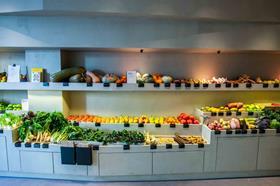
Seasonal fruit and veg supplier Natoora has set itself the target of eliminating single-use plastics from its entire network by the end of 2019.
The company – which serves over 600 London restaurants, supplies retailers and has four stores in the capital – said the change would have a “huge impact on the sustainability of the food system”. Over 20 tonnes of fresh produce arrive at Natoora’s warehouse daily.
The target for 2019 follows other steps taken by the company last year, namely replacing plastic punnets with compostable pulp punnets for wholesale and introducing compostable ‘bionets’ at retail.
Other packaging is kept to a minimum in Natoora’s wholesale supply chain, with nearly all fruit and vegetables sold loose. In addition, all orders are sent out in the crates that come in from Natoora’s growers, thus repurposing packaging that would otherwise be thrown away, and Natoora offers to collect these crates from customers on their next delivery run, to be used again the following day.
Chief executive and founder of Natoora Franco Fubini said: “In our mission to revolutionise the food system, we need to look at the supply chain from every angle. Packaging produce responsibly is just as important to the soil and to the future of our planet as using sustainable farming methods.
“It’s time to take a stand and remove plastic from the supply chain. It is an integral part of our vision for a better food system as a whole.”
Natoora’s latest retail store on Fulham Road in London represents its vision for a plastic-free consumer experience, with seasonal fruit and veg displayed loose and customers are encouraged to place produce directly into their basket.
Plastic bags have been replaced with recyclable paper alternatives, and compostable pulp punnets are used for smaller loose items such as mushrooms and berries. The store also offers customers a weekly discount when they bring their own bag.
Since Natoora also supplies retailers such as Waitrose, Ocado and Wholefoods, this inevitably requires additional packaging due to the level of handling in production, but in late 2018 Natoora switched from plastic bags to bionets made entirely out of cellulose on high volume lines such as garlic, lemons and oranges.
The material, which is created from the thinnings of sustainably-managed beechwood forests, is 100 per cent biodegradable and home-compostable. In 2019, it is expected to eliminate the use of over 700,000 plastic bags.
Removing plastic from Natoora’s wider retail channels presents the biggest challenge as it takes produce out of their careful handling and into wider distribution channels, but over the course of the year Natoora aims to eliminate plastic entirely from its retail supply chain.
Reducing food waste is also a key consideration in the decision making process, and an interdepartmental packaging team is currently trialling sustainable alternatives. Testing is taking place on compostable PLA bio-plastic, photodegradable tree-free labelling materials and plastic-free inks.
A cellulose bioplastic bag is in the final stages of testing and will, subject to final checks, be introduced across our retail channels by June 2019. This will replace a further 1.5 million non-degradable polythene bags with home compostable alternatives made from renewable sources.
These bags will bear the ‘Plastic Free’ mark of A Plastic Planet, a grassroots movement which aims to turn off the plastic tap and encourage consumers to consider the environmental impact of their choices.






No comments yet